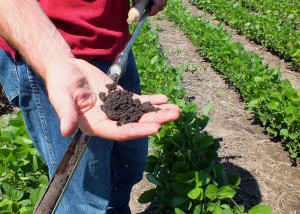50-year study on the impacts of inorganic fertilizer shows reduced soil structural stability
 Photo Credit: USDA NRCS South Dakota
Photo Credit: USDA NRCS South Dakota
Long-term use of synthetic fertilizers may have a negative impact on soil structure, according to a study published recently in the Journal of Environmental Quality. Researchers at Kansas State University, who have been observing the effects of inorganic fertilizer use on soil properties during a 50-year study, found that while the application of inorganic sources of nitrogen and phosphorus may increase soil organic carbon, these gains may be offset by hidden costs such as decreased soil macro aggregates. Soil aggregate stability is a key indicator of soil structural quality, because it affects how resistant soil is to erosion and how well water is able to move through the soil. The decreased soil aggregates could be due to ammonium ions in the synthetic fertilizer, which cause soil particles to separate rather than aggregate. This could offset any positive effects of increased soil organic carbon content, while increasing fertilizer runoff that causes pollution of waterways.

